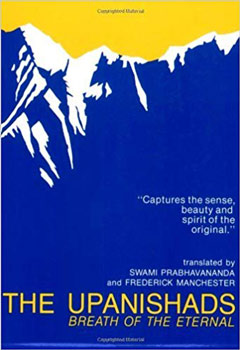Success on the spiritual path depends upon one thing—the sincerity of our intention. Our desire to find peace leads us to the path. Sincerity keeps us there.
The Katha Upanishad tells us that the spiritual path is like a razor’s edge. Yogic texts and masters promise success in yoga. By sincere and focused effort, we’ll reach our goal of perfect peace and joy. However, many obstacles might appear along the way. These obstacles deter, slow, or even stop our progress. We must learn to see and avoid them.
One of the worst obstacles on the spiritual path is the mental habit of fault-finding—inappropriate criticism of another person’s qualities. This “someone” could be a spouse, a co-worker, or even a complete stranger. We might also criticize groups of people. For example, thinking: All women are fickle; or young people don’t have good values; or the baby boomers polluted our atmosphere are all forms of fault-finding.
The habit of fault-finding destroys our inner peace. This habit is so pervasive in today’s society that it deserves special attention.
Consider this quote from Anandamayi Ma:
“To criticize people or to feel hostile towards anyone harms oneself. It puts obstacles into one’s path to the Supreme.”
This is a very direct message. As a spiritual aspirant, I’d like to take the most direct route to my goal of spiritual enlightenment. I do the same in my daily life. If I have an appointment, I get into my car and start driving. I take the shortest route so that I can arrive on time. I keep my goal in mind and don’t dawdle. Why would I treat my “spiritual appointment” any differently?
The Bliss-Permeated Mother continues her advice, knowing that we need some help to overcome this very pervasive quality:
“If someone does something bad, you should feel nothing but affection and benevolence towards him or her. Think, ‘Lord, this is also one of Your manifestations.’”
We need to break the habit of thinking ill towards someone who doesn’t meet up to our expectations. For example, these days it’s our habit to be overly critical about our public servants. We’ve never walked a day in their shoes, yet we don’t hesitate to find fault in every quality and action. How can it help our mental peace to see only faults in them?
Ma’s advice might seem almost impossible to follow, but here she gives us some encouragement:
“The more kindly and friendly you can feel and behave towards everyone, the more the way to the One, who is goodness itself, will open out.”
This advice is a stern but loving promise. If I change my attitude and behavior, I will succeed. Naturally, I wish to avoid difficulties and obstacles on my path to peace and joy.
I encourage you to take these quotes from Anandamayi Ma and write them by hand, in your own words. Write them as a personal affirmation. I did this several years ago. As a part of my daily spiritual practices, I read it aloud to myself every day.
To criticize or find faults in others harms only myself. Any form of hostility puts obstacles in my path.
If someone distresses me in any way I will remember: “Lord, this is one of your manifestations.”
As I feel compassion towards everyone, my path to God is cleared.
This attitude is the mark of a sincere seeker. It builds the foundation of your spiritual growth. Daily meditation gives you the power to believe its truth. You will find yourself being more understanding towards others. You will forgive easily. Yoga’s promise of seeing the Divine in all creation will dawn naturally in your mind. Most importantly, you will experience deep, inner peace.
Chityānanda has been a disciple of Svāmī Gurupremānanda Sarasvatī since 1975. She teaches meditation and yoga as a spiritual path in Santa Cruz, California.



Finally, catching up on my reading — I love this blog — it’s a blog that I can read the articles over and over because the articles remind me of teachings to live by. For instance the subject of fault finding in others is a very good reminder for me especially when I getting behind the wheel of my car everyday. The roads are filled with all types of drivers — mainly drivers that are distracted by their electronic devices or just bewildered by driving among so many people. This reminder makes me reflect on how to be detached from my opinions of those I share the road with and also keeps me from name calling or reduce harshness of my attitude towards these people. It encourages me to be more compassionate and less opinionated about everyone. I also agree that the quotes you listed are a good reminder of how to be benevolent in my thoughts and opinions of others. To be less judging of others I definitely need the tools of meditation and yogic teachings to become one with the pureness of love and divine energy that is contained in my heart. Thank you Svami for the wonderful words of wisdom.
Thank you, Nakisa. I’m so happy to learn that you return to the articles. Confession: so do I! With all the excess information in today’s world, it’s nice to return to the simple teachings that make us peaceful and happy. — Great example of using the principle of avoiding fault-finding in your driving. You must be the calmest driver on the road! Namaste.
Opportunities to test our tendency to find faults with others are endless. I work on this all the time.
Thank you for commenting, Tony, and good luck in your efforts. Namaste.